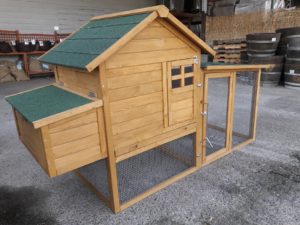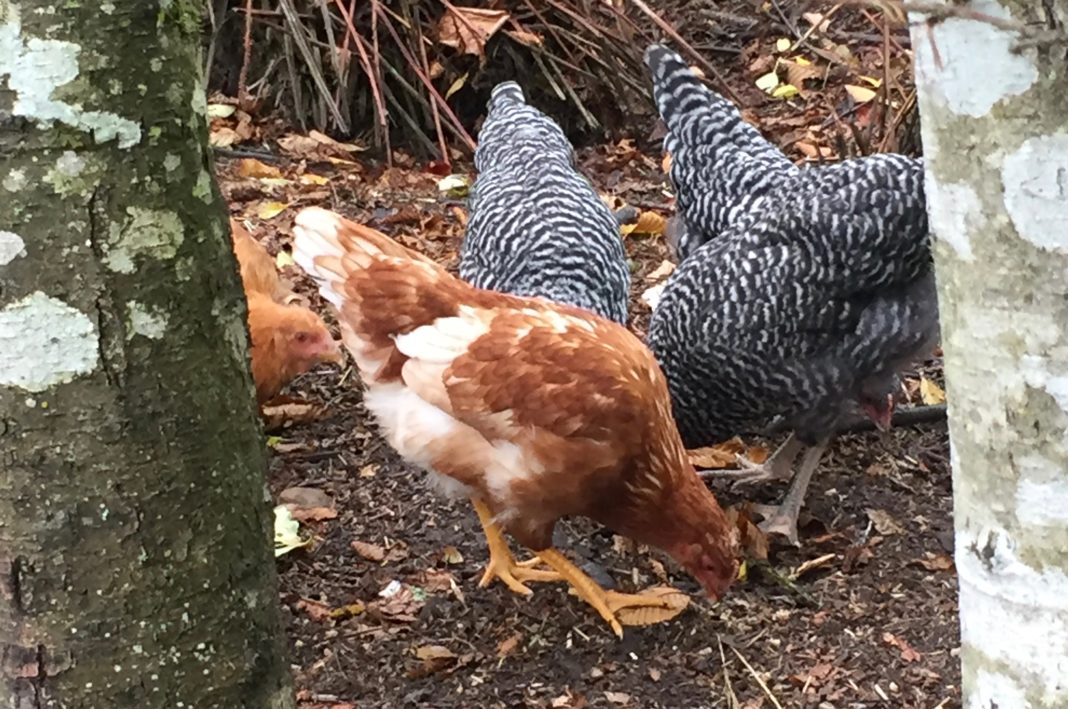Spring is here and with the longer daylight hours, “Eggs for Sale” signs will begin popping up along the roadways. But have you have ever considered raising your own chickens and, who knows, even selling eggs yourself? If you have space in your yard, “seed” money and some easy-going neighbors (as well as living in an area that allows backyard poultry), you and your family may be on the way to backyard chicken ranching.
 Chicks have been arriving at local grain stores since February with more breeds coming throughout the spring and summer. You will find favorite laying breeds like Barred Rocks and smaller, more exotic varieties like the super fluffy Silkies. With so many different sizes, colors and types of chicks to choose from, you may have a hard time deciding which chicks to buy.
Chicks have been arriving at local grain stores since February with more breeds coming throughout the spring and summer. You will find favorite laying breeds like Barred Rocks and smaller, more exotic varieties like the super fluffy Silkies. With so many different sizes, colors and types of chicks to choose from, you may have a hard time deciding which chicks to buy.
Do Your Homework
“Research breeds,” says Beverly King of Eastside Urban Farm and Garden. “Make sure you know what kind you want. Some will fly out of the fence, some are friendly, some broody and some are friendly like little dogs.”
But be careful warns Beverly’s co-worker, Caitlin Anderson. “My flock started as six and now is at 20,” She laughs. “We call that chicken math.”

Backyard Poultry and The Livestock Conservancy are just two of many sites that offer charts to help you narrow down your search. Though Livestock Conservancy’s primary focus is preserving heritage breeds, their Pick A Chick chart shows over 50 varieties including standard breeds and a conservation priority listing.
Eastside Urban Farm and Garden does a good job of helping you pick your flock, too. Every Friday new chicks arrive including at least three breeds plus ducks or turkeys. They can also talk you through the type of chickens that may work best for your yard with their weekly Chicken Chat and monthly Hatch to Hen class.
Kipperts Korner Feed and Olympia Tractor Supply both have weekly shipments of chicks coming in, too. Call Olympia Tractor Supply at 360-491-4046 to find out which breeds they currently have in stock.
If you decide to go the online route with chicks travelling via the postal system then Dunlap or McMurray hatcheries can help you out.
To get a clear idea of what is involved in raising those chicks check out the Backyard Chicken Guide to the first 60 days of raising a baby chick.
Running A-Fowl of the Law

There are a few considerations before taking the plunge into raising chickens. Mainly, guaranteeing you have the time and space for your new venture. Be sure to check city codes as they vary city by city in Thurston County. While Olympia allows up to five hens for residences under an acre, Lacey is more lenient allowing one hen per 1,000 square feet. Roosters, the icon of early-risers, are banned in both the Olympia and Lacey city limits.
Predators
Without roosters to protect the flock, it is really up to you. “Owners need to be around nights and morning to let them in and out of their pen or be in a pen that is predator proof,” says Beverly. “They have to be committed to being there or having a neighbor watch them.”
Domestic dogs, raccoons, weasels, fox, opossum, birds of prey and even skunks are common predators of the backyard flock.
Start-Up Costs
The cost of the chicks themselves is probably the least expensive of all your start-up costs, usually under $5 each. Add on chick starter feed, a heat lamp, wood chips, a water and feeding dish, and you are likely to spend less than 40 dollars. For the initial housing, most folks use something in the house – a tub or drawer for the first few weeks. After that, teenage chickens produce a lot of poop and that can make for a smelly household. Pay attention to the temperatures and be ready to move them outdoors with a heat lamp and timer as they mature. The weather and the breed you select will determine how long before they can be moved to their coop.

If you are game for building your own coop, Backyard Chickens is a good place to start researching. You may be looking at a few hundred dollars in materials unless you use salvaged material or have an existing outbuilding to add onto. If you are not a carpenter, there are loads of online sites that provide free building plans and instructions. Depending on your carpentry skills you can have a much sturdier structure when you build it yourself.
Cost for a prebuilt coop can be anywhere from $70 to $700. All the local feed stores carry coops as well as pet stores. The big box stores carry similarly priced inventory that can be found with a bit of research. Local crafts people also offer some incredible coops of varying sizes. Check Craig’s List and other online sales resources for local options.
Don’t Count Your Chickens…
Are you going to make a fortune raising chickens? Nope, chances are slim. But you can cut down your grocery bill and possibly teach your children a few things about economics and responsibility. Thurston County 4-H coordinator, Dianna Ullery says, “By maintaining a project Record Book, members can set goals, maintain a budget and manage the finances involved in raising animals. In some cases, members have been able to develop an egg production business model that helps pay for college.”

Beverly from Eastside Urban Farm and Garden agrees. “Financially, it’s the best thing. When it comes to health, it is the best thing, And when it comes to animal welfare, it is the best as well.”
If you are wondering exactly how that “chicken math” works, Beverly provides this example: “I wanted to raise my own chickens because they are healthier and I can give them better food,” she explains. Then adds laughing, “And then I fell in love with them. They are just wonderful and so fun to watch.”
Thrifty Thurston highlights inexpensive family fun in Thurston County. The weekly series focuses on family-friendly activities throughout our community. If you have a suggestion for a post, send us a note at submit@thurstontalk.com. For more events and to learn what’s happening in Olympia, Lacey, Tumwater and the surrounding area, visit our complete events calendar.
















































